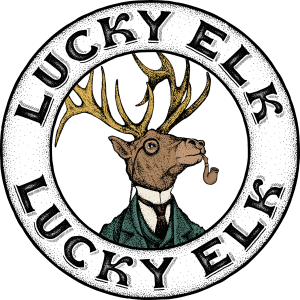Lucky Elk featured in DOPE magazine
Elk Mountain Farm: Permaculture - Back to Basics
In this technologically-savvy cannabis world wherein farmers use computer systems to monitor water and fertilization needs of cannabis plants; wherein promotion is done as we scroll and double-tap; wherein most of us are a short walk to a grocery store and from far removed from farming, Tucker Pyne of Elk Mountain Hemp [dba Lucky Elk] is going back to the basics by utilizing permaculture.
Permaculture is a term coined in 1978 as, “The conscious design and maintenance of agriculturally productive systems which have the diversity, stability and resilience of natural ecosystems.” Pyne chooses permaculture as his farming method to create a diverse, sustainable system for working with the land to promote the health and fertility of his soil and crops. He believes that working with the land is a superior way to farm relative to working against it. “Permaculture takes a slower approach to soil building, and it doesn’t seek to mine every ounce of N, P and K from the soil each season … permaculture is better for the land and the community,” Pyne reiterates. Pumping the soil and plants full of artificial fertilizers and pesticides is not natural and not how he wants to farm. That said, Pyne shares that, “Permaculture practices have greater yields than even traditional organic practices. This is really the crux of what makes Elk Mountain Hemp stand out among competitors.”
Pyne has always been drawn to farming as a “means to regenerate the land and community.” For him, coming to Oregon in 2011, to the Rogue River area of Southern Oregon to farm, was the first step. “My goal was to become an organic vegetable farmer, and I stayed plenty busy harvesting and selling heirloom tomatoes and kale at the local farmer’s markets.” His farm produced organic vegetables, berries, orchard fruits, and meats.
While Pyne still grows organic vegetables, berries and orchard fruit as well as raising animals for meat, his farm (since 2017) has focused more on cannabis and hemp. Pyne was approached by a dispensary looking to hire experienced organic farmers to grow cannabis. This was Pyne’s entrance into the cannabis space. “Any hesitancy I felt about getting involved in the cannabis industry evaporated when I began to hear firsthand how cannabis was changing people’s lives,” he shares. This was his “Aha!” moment, realizing that, “most of the patients were reluctant cannabis users, who simply appreciated a safer and more effective alternative to prescription meds.” He felt good about what he was growing and how he was growing it. “Planting CBD hemp seems like the perfect direction for the farm,” Pyne continues. “Both THC cannabis and CBD hemp have too many benefits to list.”
Pyne learned early on that his role is “to be a steward of the land for the next generation.” He does this by adding organic matter to the soil throughout the year and balancing the pH and trace minerals. Approaching the building of his soil as a long-term endeavor, he explains, “I grew buckwheat as a cover-crop for my hemp field last year and raised a dozen lambs on the field. Then I plowed under the cover-crop, adding nutrients back to the soil.” He regularly rotates crops, so fields have a chance to rest and the soil is never depleted by the demands of any single crop.



